Yichun Yin
and Other Contributors
Safe: Enhancing Mathematical Reasoning in Large Language Models via Retrospective Step-aware Formal Verification
Jun 05, 2025



Abstract:Chain-of-Thought (CoT) prompting has become the de facto method to elicit reasoning capabilities from large language models (LLMs). However, to mitigate hallucinations in CoT that are notoriously difficult to detect, current methods such as process reward models (PRMs) or self-consistency operate as opaque boxes and do not provide checkable evidence for their judgments, possibly limiting their effectiveness. To address this issue, we draw inspiration from the idea that "the gold standard for supporting a mathematical claim is to provide a proof". We propose a retrospective, step-aware formal verification framework $Safe$. Rather than assigning arbitrary scores, we strive to articulate mathematical claims in formal mathematical language Lean 4 at each reasoning step and provide formal proofs to identify hallucinations. We evaluate our framework $Safe$ across multiple language models and various mathematical datasets, demonstrating a significant performance improvement while offering interpretable and verifiable evidence. We also propose $FormalStep$ as a benchmark for step correctness theorem proving with $30,809$ formal statements. To the best of our knowledge, our work represents the first endeavor to utilize formal mathematical language Lean 4 for verifying natural language content generated by LLMs, aligning with the reason why formal mathematical languages were created in the first place: to provide a robust foundation for hallucination-prone human-written proofs.
Pangu Light: Weight Re-Initialization for Pruning and Accelerating LLMs
May 26, 2025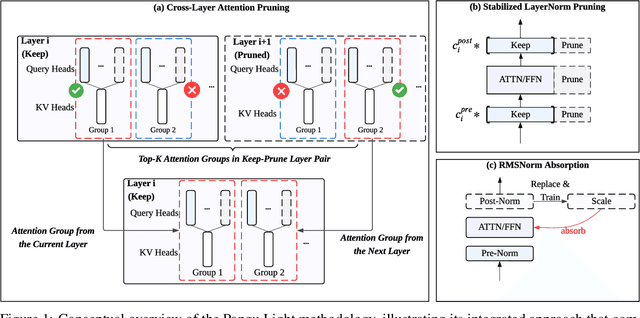

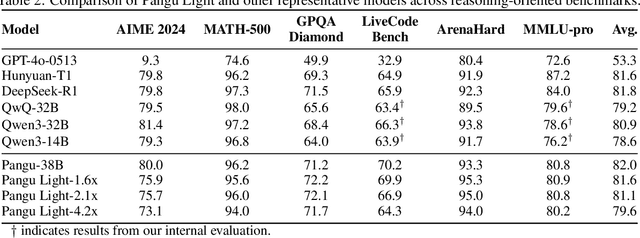
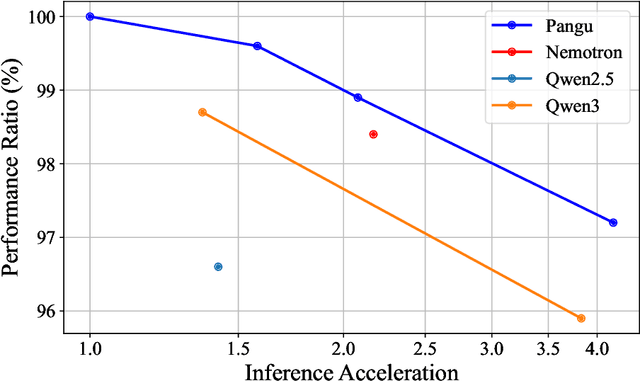
Abstract:Large Language Models (LLMs) deliver state-of-the-art capabilities across numerous tasks, but their immense size and inference costs pose significant computational challenges for practical deployment. While structured pruning offers a promising avenue for model compression, existing methods often struggle with the detrimental effects of aggressive, simultaneous width and depth reductions, leading to substantial performance degradation. This paper argues that a critical, often overlooked, aspect in making such aggressive joint pruning viable is the strategic re-initialization and adjustment of remaining weights to improve the model post-pruning training accuracies. We introduce Pangu Light, a framework for LLM acceleration centered around structured pruning coupled with novel weight re-initialization techniques designed to address this ``missing piece''. Our framework systematically targets multiple axes, including model width, depth, attention heads, and RMSNorm, with its effectiveness rooted in novel re-initialization methods like Cross-Layer Attention Pruning (CLAP) and Stabilized LayerNorm Pruning (SLNP) that mitigate performance drops by providing the network a better training starting point. Further enhancing efficiency, Pangu Light incorporates specialized optimizations such as absorbing Post-RMSNorm computations and tailors its strategies to Ascend NPU characteristics. The Pangu Light models consistently exhibit a superior accuracy-efficiency trade-off, outperforming prominent baseline pruning methods like Nemotron and established LLMs like Qwen3 series. For instance, on Ascend NPUs, Pangu Light-32B's 81.6 average score and 2585 tokens/s throughput exceed Qwen3-32B's 80.9 average score and 2225 tokens/s.
Pangu Ultra MoE: How to Train Your Big MoE on Ascend NPUs
May 07, 2025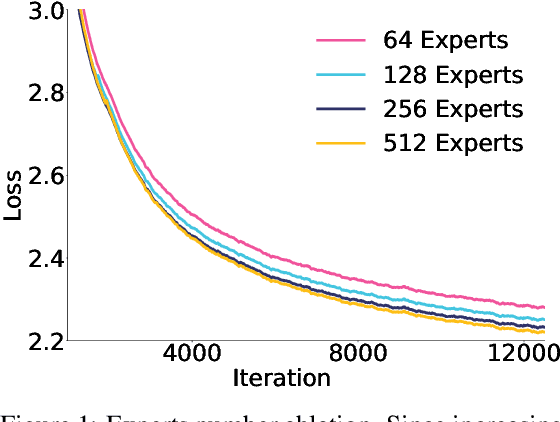

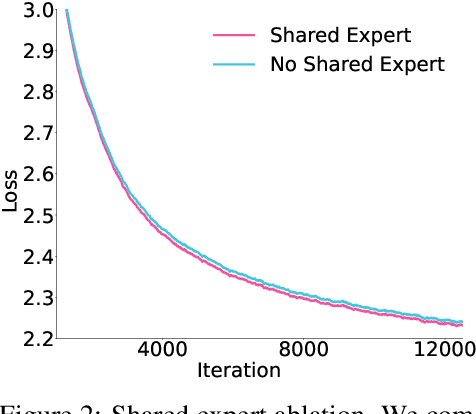

Abstract:Sparse large language models (LLMs) with Mixture of Experts (MoE) and close to a trillion parameters are dominating the realm of most capable language models. However, the massive model scale poses significant challenges for the underlying software and hardware systems. In this paper, we aim to uncover a recipe to harness such scale on Ascend NPUs. The key goals are better usage of the computing resources under the dynamic sparse model structures and materializing the expected performance gain on the actual hardware. To select model configurations suitable for Ascend NPUs without repeatedly running the expensive experiments, we leverage simulation to compare the trade-off of various model hyperparameters. This study led to Pangu Ultra MoE, a sparse LLM with 718 billion parameters, and we conducted experiments on the model to verify the simulation results. On the system side, we dig into Expert Parallelism to optimize the communication between NPU devices to reduce the synchronization overhead. We also optimize the memory efficiency within the devices to further reduce the parameter and activation management overhead. In the end, we achieve an MFU of 30.0% when training Pangu Ultra MoE, with performance comparable to that of DeepSeek R1, on 6K Ascend NPUs, and demonstrate that the Ascend system is capable of harnessing all the training stages of the state-of-the-art language models. Extensive experiments indicate that our recipe can lead to efficient training of large-scale sparse language models with MoE. We also study the behaviors of such models for future reference.
Pangu Ultra: Pushing the Limits of Dense Large Language Models on Ascend NPUs
Apr 10, 2025



Abstract:We present Pangu Ultra, a Large Language Model (LLM) with 135 billion parameters and dense Transformer modules trained on Ascend Neural Processing Units (NPUs). Although the field of LLM has been witnessing unprecedented advances in pushing the scale and capability of LLM in recent years, training such a large-scale model still involves significant optimization and system challenges. To stabilize the training process, we propose depth-scaled sandwich normalization, which effectively eliminates loss spikes during the training process of deep models. We pre-train our model on 13.2 trillion diverse and high-quality tokens and further enhance its reasoning capabilities during post-training. To perform such large-scale training efficiently, we utilize 8,192 Ascend NPUs with a series of system optimizations. Evaluations on multiple diverse benchmarks indicate that Pangu Ultra significantly advances the state-of-the-art capabilities of dense LLMs such as Llama 405B and Mistral Large 2, and even achieves competitive results with DeepSeek-R1, whose sparse model structure contains much more parameters. Our exploration demonstrates that Ascend NPUs are capable of efficiently and effectively training dense models with more than 100 billion parameters. Our model and system will be available for our commercial customers.
Teaching LLMs According to Their Aptitude: Adaptive Reasoning for Mathematical Problem Solving
Feb 17, 2025



Abstract:Existing approaches to mathematical reasoning with large language models (LLMs) rely on Chain-of-Thought (CoT) for generalizability or Tool-Integrated Reasoning (TIR) for precise computation. While efforts have been made to combine these methods, they primarily rely on post-selection or predefined strategies, leaving an open question: whether LLMs can autonomously adapt their reasoning strategy based on their inherent capabilities. In this work, we propose TATA (Teaching LLMs According to Their Aptitude), an adaptive framework that enables LLMs to personalize their reasoning strategy spontaneously, aligning it with their intrinsic aptitude. TATA incorporates base-LLM-aware data selection during supervised fine-tuning (SFT) to tailor training data to the model's unique abilities. This approach equips LLMs to autonomously determine and apply the appropriate reasoning strategy at test time. We evaluate TATA through extensive experiments on six mathematical reasoning benchmarks, using both general-purpose and math-specialized LLMs. Empirical results demonstrate that TATA effectively combines the complementary strengths of CoT and TIR, achieving superior or comparable performance with improved inference efficiency compared to TIR alone. Further analysis underscores the critical role of aptitude-aware data selection in enabling LLMs to make effective and adaptive reasoning decisions and align reasoning strategies with model capabilities.
CoIR: A Comprehensive Benchmark for Code Information Retrieval Models
Jul 03, 2024



Abstract:Despite the substantial success of Information Retrieval (IR) in various NLP tasks, most IR systems predominantly handle queries and corpora in natural language, neglecting the domain of code retrieval. Code retrieval is critically important yet remains under-explored, with existing methods and benchmarks inadequately representing the diversity of code in various domains and tasks. Addressing this gap, we present \textbf{\name} (\textbf{Co}de \textbf{I}nformation \textbf{R}etrieval Benchmark), a robust and comprehensive benchmark specifically designed to assess code retrieval capabilities. \name comprises \textbf{ten} meticulously curated code datasets, spanning \textbf{eight} distinctive retrieval tasks across \textbf{seven} diverse domains. We first discuss the construction of \name and its diverse dataset composition. Further, we evaluate nine widely used retrieval models using \name, uncovering significant difficulties in performing code retrieval tasks even with state-of-the-art systems. To facilitate easy adoption and integration within existing research workflows, \name has been developed as a user-friendly Python framework, readily installable via pip. It shares same data schema as other popular benchmarks like MTEB and BEIR, enabling seamless cross-benchmark evaluations. Through \name, we aim to invigorate research in the code retrieval domain, providing a versatile benchmarking tool that encourages further development and exploration of code retrieval systems\footnote{\url{ https://github.com/CoIR-team/coir}}.
Preparing Lessons for Progressive Training on Language Models
Jan 18, 2024



Abstract:The rapid progress of Transformers in artificial intelligence has come at the cost of increased resource consumption and greenhouse gas emissions due to growing model sizes. Prior work suggests using pretrained small models to improve training efficiency, but this approach may not be suitable for new model structures. On the other hand, training from scratch can be slow, and progressively stacking layers often fails to achieve significant acceleration. To address these challenges, we propose a novel method called Apollo, which prep\textbf{a}res lessons for ex\textbf{p}anding \textbf{o}perations by \textbf{l}earning high-\textbf{l}ayer functi\textbf{o}nality during training of low layers. Our approach involves low-value-prioritized sampling (LVPS) to train different depths and weight sharing to facilitate efficient expansion. We also introduce an interpolation method for stable model depth extension. Experiments demonstrate that Apollo achieves state-of-the-art acceleration ratios, even rivaling methods using pretrained models, making it a universal and efficient solution for training deep models while reducing time, financial, and environmental costs.
TRIGO: Benchmarking Formal Mathematical Proof Reduction for Generative Language Models
Oct 24, 2023Abstract:Automated theorem proving (ATP) has become an appealing domain for exploring the reasoning ability of the recent successful generative language models. However, current ATP benchmarks mainly focus on symbolic inference, but rarely involve the understanding of complex number combination reasoning. In this work, we propose TRIGO, an ATP benchmark that not only requires a model to reduce a trigonometric expression with step-by-step proofs but also evaluates a generative LM's reasoning ability on formulas and its capability to manipulate, group, and factor number terms. We gather trigonometric expressions and their reduced forms from the web, annotate the simplification process manually, and translate it into the Lean formal language system. We then automatically generate additional examples from the annotated samples to expand the dataset. Furthermore, we develop an automatic generator based on Lean-Gym to create dataset splits of varying difficulties and distributions in order to thoroughly analyze the model's generalization ability. Our extensive experiments show our proposed TRIGO poses a new challenge for advanced generative LM's including GPT-4 which is pre-trained on a considerable amount of open-source formal theorem-proving language data, and provide a new tool to study the generative LM's ability on both formal and mathematical reasoning.
DQ-LoRe: Dual Queries with Low Rank Approximation Re-ranking for In-Context Learning
Oct 19, 2023Abstract:Recent advances in natural language processing, primarily propelled by Large Language Models (LLMs), have showcased their remarkable capabilities grounded in in-context learning. A promising avenue for guiding LLMs in intricate reasoning tasks involves the utilization of intermediate reasoning steps within the Chain-of-Thought (CoT) paradigm. Nevertheless, the central challenge lies in the effective selection of exemplars for facilitating in-context learning. In this study, we introduce a framework that leverages Dual Queries and Low-rank approximation Re-ranking (DQ-LoRe) to automatically select exemplars for in-context learning. Dual Queries first query LLM to obtain LLM-generated knowledge such as CoT, then query the retriever to obtain the final exemplars via both question and the knowledge. Moreover, for the second query, LoRe employs dimensionality reduction techniques to refine exemplar selection, ensuring close alignment with the input question's knowledge. Through extensive experiments, we demonstrate that DQ-LoRe significantly outperforms prior state-of-the-art methods in the automatic selection of exemplars for GPT-4, enhancing performance from 92.5% to 94.2%. Our comprehensive analysis further reveals that DQ-LoRe consistently outperforms retrieval-based approaches in terms of both performance and adaptability, especially in scenarios characterized by distribution shifts. DQ-LoRe pushes the boundaries of in-context learning and opens up new avenues for addressing complex reasoning challenges. We will release the code soon.
Reusing Pretrained Models by Multi-linear Operators for Efficient Training
Oct 16, 2023Abstract:Training large models from scratch usually costs a substantial amount of resources. Towards this problem, recent studies such as bert2BERT and LiGO have reused small pretrained models to initialize a large model (termed the ``target model''), leading to a considerable acceleration in training. Despite the successes of these previous studies, they grew pretrained models by mapping partial weights only, ignoring potential correlations across the entire model. As we show in this paper, there are inter- and intra-interactions among the weights of both the pretrained and the target models. As a result, the partial mapping may not capture the complete information and lead to inadequate growth. In this paper, we propose a method that linearly correlates each weight of the target model to all the weights of the pretrained model to further enhance acceleration ability. We utilize multi-linear operators to reduce computational and spacial complexity, enabling acceptable resource requirements. Experiments demonstrate that our method can save 76\% computational costs on DeiT-base transferred from DeiT-small, which outperforms bert2BERT by +12.0\% and LiGO by +20.7\%, respectively.
 Add to Chrome
Add to Chrome Add to Firefox
Add to Firefox Add to Edge
Add to Edge